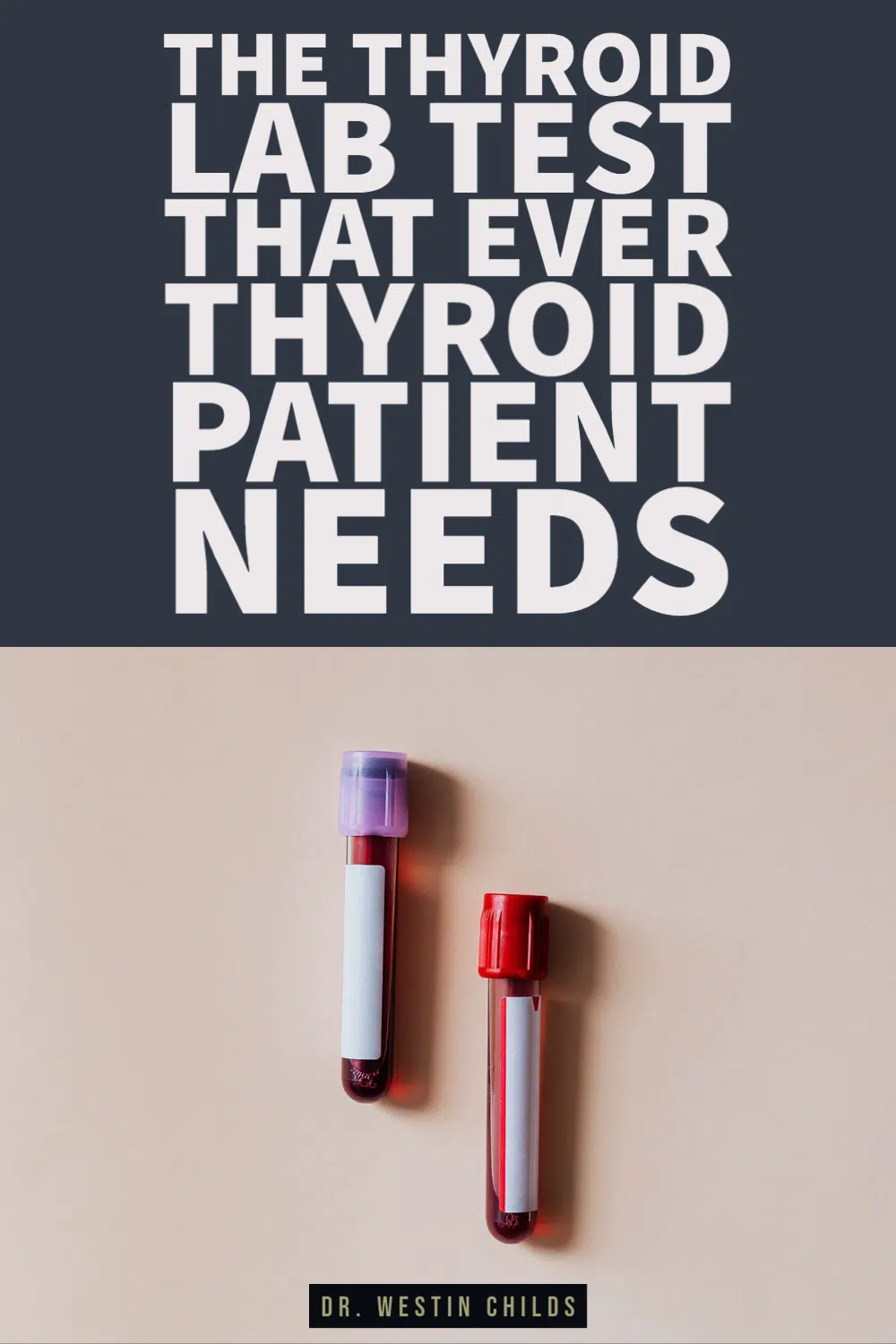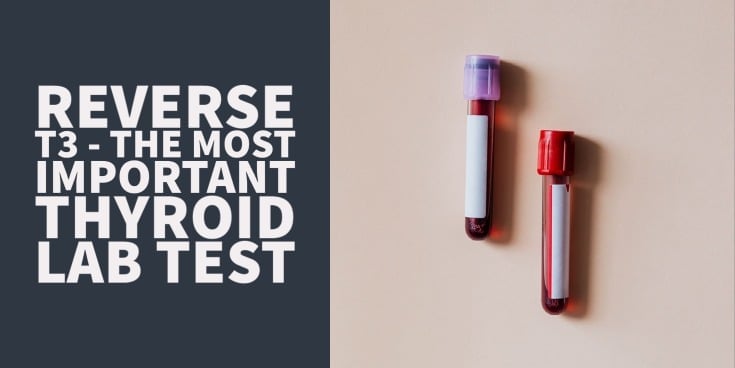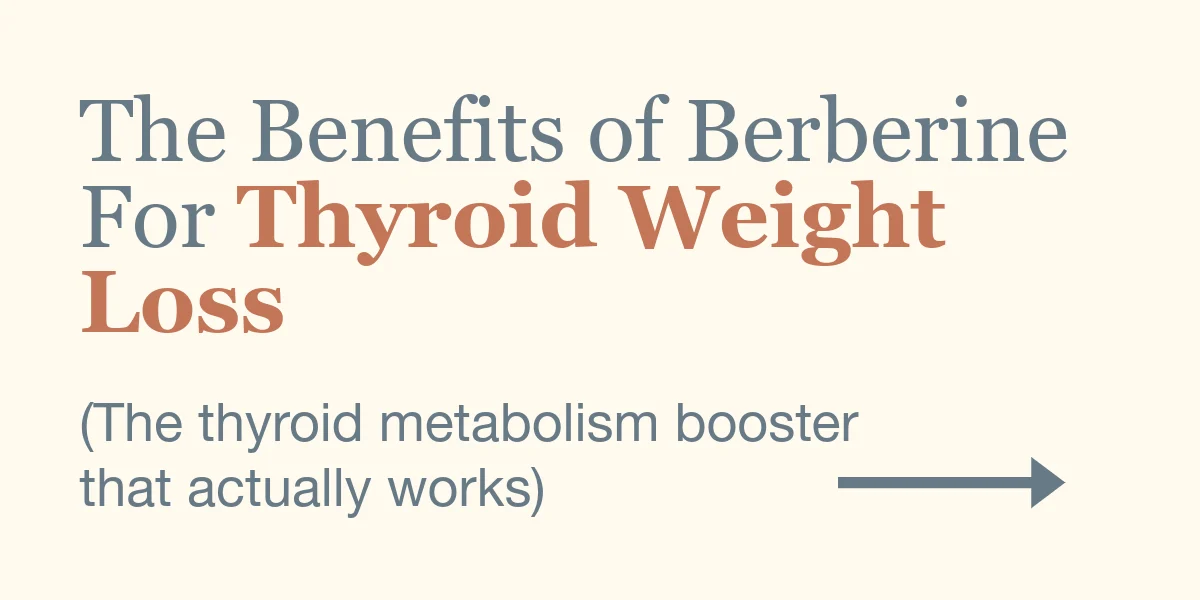We are going back to the basics today to talk about one of the MOST important thyroid lab tests that many of you probably have never heard about.
I know what you’re thinking…
If it’s so important, why hasn’t my doctor ordered it and why haven’t I heard about it?
I’m going to explain the reason for that in a minute, but for now, let’s talk about some of the basics of reverse T3.
It’s best to understand reverse T3 in the context of thyroid physiology.
And thyroid physiology is just a fancy way of referring to how the thyroid gland functions in your body from start to finish.
You see, most doctors only ever focus on something called the TSH which is produced by your brain.
But if your doctor only focuses on the TSH, he or she will miss out on tons of other relevant and important information that can be found downstream.
To put this into context, let’s define some basic thyroid terms:
- TSH – TSH stands for thyroid stimulating hormone and it is produced in the pituitary gland in your brain. It acts to stimulate the thyroid gland to tell it to produce more thyroid hormone.
- Free T4 – Free T4 is one of two active thyroid hormones produced by the thyroid gland. What you need to know is that T4 is NOT active by itself and must be converted into T3.
- Free T3 – T3 is the most powerful and potent thyroid hormone in your body. Most of it is created when your body turns T4 into T3.
- Reverse T3 – Reverse T3 is an anti-thyroid metabolite that acts to completely BLOCK your thyroid from working. Reverse T3 is created by the body from T4. Your body can either turn T4 into T3 or into reverse T3 based on what it needs.
It’s VERY important for you to understand these 4 different aspects of thyroid function so if this is your first time reading about them make sure you read them again to let it sink in.
DOWNLOAD FREE RESOURCES
Foods to Avoid if you Have Thyroid Problems:
I’ve found that these 10 foods cause the most problems for thyroid patients. Learn which foods you should avoid if you have thyroid disease of any type.
The Complete List of Thyroid Lab tests:
The list includes optimal ranges, normal ranges, and the complete list of tests you need to diagnose and manage thyroid disease correctly!
What Information Does Reverse T3 Give You?
Once you do that you may be asking yourself this question:
“Why does my body even produce reverse T3?”
The answer is simple!
Reverse T3 is created by the body as a way to manage and control how much thyroid hormone your body can use at any given time.
If your body didn’t have reverse T3 then it would be very easy for your body to accidentally pump out too much thyroid hormone which would send you into hyperthyroidism.
Reverse T3 helps your body carefully determine how much thyroid hormone is active at any given time.
But this is where the problems begin…
Certain conditions can hijack this system and cause it to run haywire.
These conditions then create a situation in which your thyroid is artificially slowed down.
The slower your thyroid is the harder it will be for you to feel better.
So when you check for reverse T3 it gives you some valuable information about how well your body is using thyroid hormone.
If, for instance, you order your reverse T3 level and find that it is quite high (which is a bad thing, by the way) you will know that your body is having trouble converting T4 into the active thyroid hormone T3.
If, on the other hand, you order your reverse T3 level and find that it is quite low (which is sometimes a good thing) you will know that your body is NOT having trouble producing the active thyroid hormone T3.
The process by which your body takes T4 and turns it into either T3 or reverse T3 is known as thyroid conversion.
And checking your reverse T3 gives you valuable information about how well this process is occurring in your body.
Why Won’t My Doctor Order Reverse T3?
If this information is so helpful, why hasn’t my doctor ordered this test for me?
That is the question of the decade and one that I will demystify for you right now!
The answer is actually very simple:
Doctors, especially endocrinologists, have already made up their minds about testing and managing thyroid problems.
They believe that the only test necessary to evaluate the thyroid is the TSH and that all other additional tests provide no further useful information.
This mode of thyroid management is referred to as the “standard of care” (1).
And the standard of care is the methodology behind treating any given disease state.
It just so happens that the standard of care for thyroid management (treating low thyroid) is to test for TSH (2) and provide treatment in the form of levothyroxine (3).
The problem with this standard is that it does NOT work for everyone.
There are plenty of thyroid patients who do not respond well to this standard and who continue to experience thyroid symptoms despite having a normal TSH.
It is THESE patients that we are primarily concerned about here.
Reverse T3 can be used to help provide additional information for patients who are otherwise not responding to this standard.
How do you know if you fall into this category?
It’s simple.
If you are someone who is faithfully taking your thyroid medication and still experiencing symptoms such as weight gain, fatigue, hair loss, constipation, etc. then you would benefit from the use of reverse T3.

Even though you may benefit from the additional information that reverse T3 testing provides, it may still be difficult to get your doctor to order it.
Because doctors are not accustomed to ordering the reverse T3, they have a hard time interpreting or understanding the results that it provides.
So even if you do manage to get your doctor to order it, it’s unlikely that they will have anything insightful about the results once you do.
The good news is that you don’t need them.
I have provided plenty of free resources on my blog in the form of videos and articles that walk you through exactly how to interpret your reverse T3 lab results.
Why Every Thyroid Patient Needs To Get Reverse T3 Tested
I consider reverse T3 to be one of the most important thyroid lab tests available because of the information it gives you about thyroid conversion.
Remember:
Thyroid conversion is a process going on in your body at ALL times and it’s the process your body uses to activate thyroid hormone.
This process is separate and different from the process of TSH production which is what most doctors focus on.
To get a clear picture of thyroid function in your body you need to get all of the available thyroid lab tests.
It’s both possible and likely, for instance, that even though your TSH level is normal, your body may still have problems converting T4 into T3.
If reverse T3 levels build up in your body, then it doesn’t matter how much free T3 is available.
Reverse T3 will act to block that free T3 and it will prevent your body from feeling better.
Thyroid Medication & Your Reverse T3 Level
Knowing that your reverse T3 is high, for instance, can also give you information about what type of thyroid medication would be best for you.
Thyroid patients who have a normal or low reverse T3 level tend to do just fine taking T4-only thyroid medications like levothyroxine and Synthroid.
Thyroid patients who have a high reverse T3, on the other hand, tend to do better on medications that contain T3 thyroid hormone.
Certain thyroid medications, such as Cytomel and liothyronine, contain the active T3 thyroid hormone directly.
And by using these powerful medications you can completely bypass the thyroid conversion process.
Taking pure T3 thyroid medications will drive down reverse T3 levels as they do.
Switching up your thyroid medication isn’t the only way to manage reverse T3 issues, however!
Other natural treatments such as changing up your diet, reducing inflammation in your body, regular exercise, and even taking certain supplements can all help to improve your reverse T3.
Final Thoughts
Reverse T3 testing is something that you can look at every single time you get your thyroid lab tests drawn.
The next time you are scheduled to get your TSH checked, make sure to ask for your free T4, free T3, and reverse T3 as well.
Now I want to hear from you:
Is this the first time you’ve heard about reverse T3 testing?
Do you feel like you understand how important reverse T3 testing is for your thyroid?
Are you planning on asking your doctor to order this test for you the next time you go in?
Leave your questions or comments below!
Scientific References
#1. https://www.ncbi.nlm.nih.gov/pmc/articles/PMC3088386/
#2. https://www.ncbi.nlm.nih.gov/pmc/articles/PMC5321289/
#3. https://www.mayoclinic.org/diseases-conditions/hypothyroidism/diagnosis-treatment/drc-20350289








